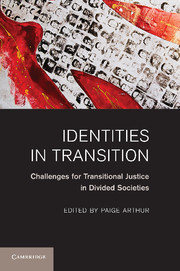Book contents
- Frontmatter
- Contents
- Acknowledgments
- Author Bios
- Introduction: Identities in Transition
- PART I IDENTITY IN TRANSITIONAL JUSTICE MEASURES
- 1 Indigenous Peoples and Claims for Reparation: Tentative Steps in Peru and Guatemala
- 2 Truth Telling, Identities, and Power in South Africa and Guatemala
- 3 Security System Reform and Identity in Divided Societies: Lessons from Northern Ireland
- 4 Staging Violence, Staging Identities: Identity Politics in Domestic Prosecutions
- 5 International and Hybrid Criminal Tribunals: Reconciling or Stigmatizing?
- 6 Silences, Visibility, and Agency: Ethnicity, Class, and Gender in Public Memorialization
- PART II IDENTITIES, TRANSITION, AND TRANSFORMATION
- Index
6 - Silences, Visibility, and Agency: Ethnicity, Class, and Gender in Public Memorialization
Published online by Cambridge University Press: 01 March 2011
- Frontmatter
- Contents
- Acknowledgments
- Author Bios
- Introduction: Identities in Transition
- PART I IDENTITY IN TRANSITIONAL JUSTICE MEASURES
- 1 Indigenous Peoples and Claims for Reparation: Tentative Steps in Peru and Guatemala
- 2 Truth Telling, Identities, and Power in South Africa and Guatemala
- 3 Security System Reform and Identity in Divided Societies: Lessons from Northern Ireland
- 4 Staging Violence, Staging Identities: Identity Politics in Domestic Prosecutions
- 5 International and Hybrid Criminal Tribunals: Reconciling or Stigmatizing?
- 6 Silences, Visibility, and Agency: Ethnicity, Class, and Gender in Public Memorialization
- PART II IDENTITIES, TRANSITION, AND TRANSFORMATION
- Index
Summary
In the last decades, political conflicts and the perpetration of mass atrocities around the world have often been interpreted – mainly by the actors themselves although also by others – as cultural, ethnic, or racial conflicts. This has been the case in South Africa, Bosnia and Herzegovina, Serbia, and Rwanda. For many, the disputes are anchored in naturalized racial or cultural identities, where cultures are conceived of as essentially different and incommensurable. There is often a further assumption, namely, that relations between different cultures are by nature hostile and mutually destructive. In consequence, conflict is seen as inevitable whenever cultures come into contact with each other. Such essentialist conceptions lead to policies of exclusion and to violent conflicts of the “either-or” type, in which there is no room for other forms of interaction, bargaining, and negotiation. Differences in ethnicity and culture are seen as the underlying condition of violent conflict (often the label “ancient hatred” is attached), and people believe that the fundamental issue over which they are fighting is the protection of their own ethnic difference, in ways that lead to “cultural fundamentalism.”
The perspective advanced in this chapter is a different one. Rather than starting with essential identities, I begin from the understanding that the sense of belonging to a certain collective body and the sense of identification with that community – be it ethnic, national, religious, cultural, or based on any other criterion – is the result of historical processes that unfold under specific economic, political, and social conditions.
- Type
- Chapter
- Information
- Identities in TransitionChallenges for Transitional Justice in Divided Societies, pp. 187 - 214Publisher: Cambridge University PressPrint publication year: 2010



